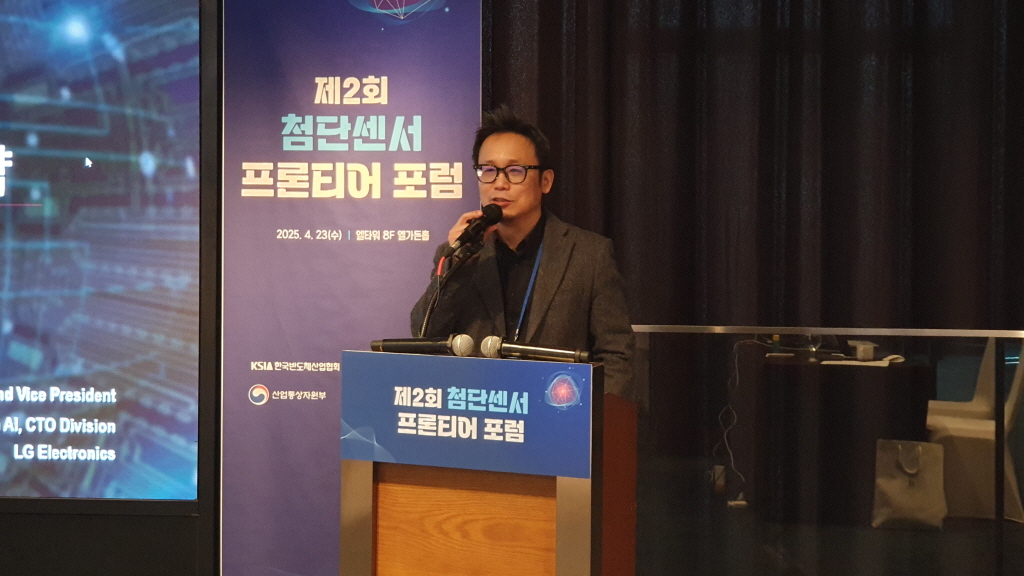김성혁 LG전자 인공지능연구소 수석연구위원(CTO, 상무)가 ‘제2회 첨단센서 프론티어 포럼’에서 ‘AI가 결합된 스마트홈 미래 전략’을 주제로 발표하며, 다양한 센서와 결합해 실시간 데이터를 분석하는 방식은 스마트홈, 차량, 헬스케어 등 다방면에서 혁신적인 변화를 만들어가고 있다며 인공지능이 우리의 삶을 이해하는 수준이 높아질수록, 그 기술은 단순한 자동화 장치를 넘어 하나의 동반자로 자리 잡게 될 것이라고 밝혔다.

▲김성혁 LG전자 인공지능연구소 수석연구위원(CTO, 상무)이 ‘제2회 첨단센서 프론티어 포럼’에서 ‘AI가 결합된 스마트홈 미래 전략’을 주제로 발표하고 있다.
스마트홈 가전서 모인 데이터 각 사용자 생활패턴 면밀 분석
AI 개인 패턴 이해 높아질수록 가전 하나의 동반자 자리매김
“냉장고, 세탁기, 공기청정기 등 각 생활 가전에서 센서를 통해 모아지는 데이터를 통해 사용자별로 패턴 및 생활환경에 대한 분석을 철저히 할 수 있고, 이런 데이터를 모아 사용자별로 맞춤 서비스가 가능해서 가전은 단순한 자동화 장치를 넘어 생활의 동반자로 자리매김 할 것이다”
김성혁 LG전자 인공지능연구소 수석연구위원(CTO, 상무)은 23일 개최된 ‘제2회 첨단센서 프론티어 포럼’에서 ‘AI가 결합된 스마트홈 미래 전략’을 주제로 발표했다.
이번 행사에서 김성혁 수석연구위원은 인공지능(AI) 기술이 빠르게 발전하며 우리의 생활 속으로 깊숙이 들어오고 있다며 특히 다양한 센서와 결합해 실시간 데이터를 분석하는 방식은 스마트홈, 차량, 헬스케어 등 다방면에서 혁신적인 변화를 만들어가고 있다고 밝혔다.
김성혁 수석연구위원은 LG전자의 최신 기술 개발 사례를 소개했는데 이를 보면, 센서 기반 AI가 어떻게 실생활에서 유용하게 적용될 수 있는지 잘 알 수 있다.
센서는 물리적인 환경을 감지하는 장치로서 AI의 학습과 판단을 돕는 핵심 역할을 한다.
공기청정기의 가스 감지 센서, 건조기의 비접촉 온도 센서, 에어컨의 밀리미터 웨이브 레이더 등 다양한 종류의 센서들이 우리 주변에서 데이터를 수집한다.
이를 AI와 결합하면 단순히 장치를 자동으로 작동시키는 것이 아니라, 실제 사용자의 행동 패턴을 분석해 더욱 적절한 서비스를 제공할 수 있다.
예를 들어 LG전자는 공기청정기에 내장된 센서를 활용해 단순한 미세먼지 감지뿐만 아니라 포름알데히드, 암모니아, 유증기 등 다양한 오염물질을 구분해 낼 수 있는 기능을 개발했다.
이를 통해 사용자 맞춤형 필터 추천 서비스까지 가능하게 된 것이다.
가전제품이 단순한 공기 정화 장치에서 맞춤형 건강 관리 도구로 진화하고 있는 셈이다.
과거에는 스마트홈이 단순히 음성 명령을 받아 가전을 작동시키는 수준이었다면, 최근 AI 센서 기술의 발전으로 인해 공간 자체가 사용자의 행동을 이해하고 반응하는 형태로 변하고 있다.
예를 들어 밀리미터 웨이브 레이더 센서가 내장된 에어컨은 사용자의 위치와 움직임을 실시간으로 감지해 바람 방향을 조정하고, 특정 온도에서 불필요한 냉방을 자동으로 줄이는 기능을 갖추게 됐다.
또한 스마트 냉장고는 사용자의 생활 패턴을 학습해 맞춤형 식품 관리 기능을 제공할 수 있다.
냉장고 내부의 센서가 음식물의 신선도를 모니터링하고, AI가 이를 분석하여 식재료의 소비 기한을 추천하는 기능 등이 대표적인 사례다.
헬스케어 분야에서도 AI 센싱 기술은 중요한 역할을 하고 있다.
LG전자의 연구에서는 생체 정보를 감지할 수 있는 스마트 모니터와 노트북을 개발해 심박수, 스트레스 지수, 혈압 등 다양한 건강 정보를 실시간으로 측정하고 분석할 수 있도록 하고 있다.
이러한 데이터가 축적되면 AI가 사용자의 건강 상태를 예측하고 적절한 조언을 제공하는 기능으로 발전할 수 있다.
이는 향후 개인 맞춤형 건강 관리 솔루션으로 더욱 정교하게 발전할 가능성을 갖고 있다.
이제 AI는 단순히 사전 입력된 명령을 실행하는 수준에서 벗어나, 센서가 제공하는 방대한 데이터를 분석하며 사람들의 행동과 생활 패턴을 학습하고 있다.
김성혁 상무가 제안한 ‘홈 로봇’ 개념은 가전제품 뿐만 아니라 공간 자체가 하나의 인공지능 로봇으로 발전하는 방향을 시사하고 있다.
냉장고, 공기청정기, 건조기, 에어컨 등이 각자의 센서를 통해 데이터를 수집하고, AI가 이를 종합 분석하여 보다 스마트한 서비스 제공이 가능해지는 것이다.
김성혁 상무는 “이러한 변화는 우리의 생활을 더욱 편리하고 건강하게 만들 뿐만 아니라, 보다 개인화된 맞춤형 환경을 제공하는 데 중점을 두고 있다”며 “인공지능이 우리의 삶을 이해하는 수준이 높아질수록, 그 기술은 단순한 자동화 장치를 넘어 하나의 동반자로 자리 잡게 될 것”이라고 밝혔다.
